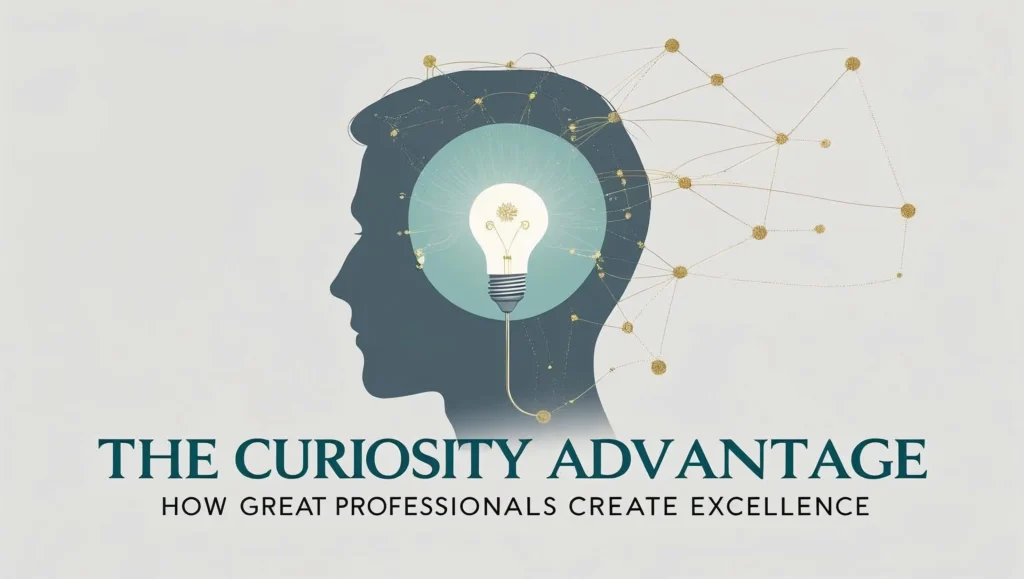
Excellence Rarely Starts with Answers — It Starts with Questions
The other evening, I asked my six-year-old son whether he had eaten. He nodded, then looked up at me and asked, “Papa, why do we eat food?” I answered him. A few seconds later, he followed up: “Can we live without food?” And then: “Why don’t we feel hungry when we’re sleeping?” Each answer only opened the door to a deeper question. For his age, these were serious questions — his way of navigating complex ideas with a young but active mind.
It struck me then — what seemed ordinary for him revealed something profound to me: this was curiosity in its purest form, unfiltered by fear or ego.
In both life and work, curiosity is often misunderstood — mistaken for naivety or even inefficiency. But in truth, it’s one of the most powerful catalysts for growth and lasting excellence.
Curiosity isn’t just a personality trait — it’s a human operating system. When practiced deliberately, it becomes a powerful driver of better thinking, sharper decisions, and the kind of excellence that leads to meaningful, enduring great works.
This isn’t a motivational piece — it’s a practical framework for how high-performing professionals turn curiosity into a serious advantage. It’s a practical guide to how high-performing professionals use curiosity as a serious edge — asking sharper questions, uncovering more profound insights, sidestepping blind spots, and driving results that last. When used with intention, curiosity doesn’t just spark ideas — it becomes a long-term competitive advantage in their career growth, especially when aligned with a clear purpose.
What Curiosity Means in a Professional Context
Curiosity in professional settings is not about daydreaming or abstract wonder — it’s about disciplined, deliberate inquiry. It’s about disciplined inquiry — the habit of asking better questions before making big decisions. Strategic curiosity looks like this: a product leader who asks why users abandon the checkout page, a founder who digs deep into market shifts before launching a new service, or a manager who challenges the assumption that “this is how we’ve always done it.”
In my own experience working with diverse teams, the most valuable contributors weren’t always the fastest to act — they were the ones who paused to investigate patterns others ignored. They identified emerging customer pain points before they escalated into crises. They reframed problems by asking, “What if the real issue isn’t what we think it is?”
Curiosity, when applied professionally, is not passive. It’s active — a deliberate tool to reduce blind spots, spark innovation, and make sharper decisions. It transforms uncertainty into opportunity and noise into clarity.
The great professionals — the ones who set outstanding examples — aren’t the ones with all the answers. They are the ones who know which questions to ask and when to ask them, driven by a growth mindset rather than the need to appear confident.
Why Curiosity Creates Excellence: The Three Levers of Growth
Among other defining traits, one shows up consistently in top-performing professionals across industries: they don’t rush into action — especially when it matters most. They pause, reflect, and lean into the right questions first. They pause, reflect, and lean into the right questions first. Curiosity, when practiced deliberately, activates three powerful levers that elevate performance, deepen mastery, and build influence.
I was reminded of this idea while reading A Curious Mind by Brian Grazer — a fantastic book on how curiosity can fuel innovation and leadership.
1. Curiosity Deepens Understanding Before Execution
Most poor decisions aren’t the result of laziness — they are the result of assumptions. Curiosity forces a pause before action. It leads professionals to ask: What don’t we know yet? What could we be missing?
Consider a product manager preparing to launch a new feature. Instead of rushing to execution, the curious leader interviews users, studies behavior data, and asks: What problem are we really solving? The result? Fewer costly reworks, more targeted solutions, and stronger adoption.
In my consulting work, I have seen teams turn around underperforming projects simply by revisiting their first assumptions. Often, the issue wasn’t in the execution — it was in asking the wrong questions at the start. Curiosity helps surface blind spots before they become breakdowns.
Researchers have found that curiosity isn’t one-dimensional. In fact, it shows up in diverse ways — from joy-driven exploration to stress-induced problem-solving. Harvard Business Review outlines The Five Dimensions of Curiosity that influence how we seek knowledge, make decisions, and relate to others.
2. Curiosity Drives Mastery Through Iteration
Excellence isn’t a destination — it’s a continuous process. When we stop learning, our declining begins. Curious professionals resist the comfort of the plateau. They treat feedback as fuel and iteration as strategy.
I once worked alongside a senior leader in the media industry who, despite two decades of experience, treated every campaign review like a learning session. He asked junior team members what they were seeing in the data. He sought feedback not just from peers, but from customers. Over time, he stayed relevant in a fast-changing landscape — not because he knew more, but because he kept asking.
Curiosity fuels feedback loops. It keeps professionals open, adaptable, and evolving on the path to mastery through iteration. In a world where skillsets become redundant quickly, this isn’t optional — it’s essential.
3. Curiosity Builds Bridges and Influence
In high-stakes environments, influence is not just about authority. It’s about alignment — and that starts with understanding. Curious professionals don’t assume they know what others think. They ask. They listen. And because of that, they collaborate better and lead smarter.
A founder I once advised made it a rule to ask why someone disagreed with him before defending his position. That simple act of curiosity did not just resolve conflicts; it built loyalty. People felt heard, not steamrolled. Teams functioned with more psychological safety, and decisions reflected a broader range of insights.
When curiosity leads the way, communication improves, empathy rises, silos shrink, and culture strengthens. Influence, in this context, isn’t forced — it’s earned.
The Hidden Enemies of Curiosity in the Workplace
If curiosity is the fuel for professional excellence, then ego, speed, and fear are the silent brakes that stop it from flowing.
Ego shows up as the “I already know” mindset. It’s most dangerous when people succeed early — and start believing their past answers will solve future problems. In leadership roles, I have often seen how ego quietly erodes openness. The more experience someone gains, the harder it becomes to say, “I don’t know — let’s explore it.”
Speed is another enemy. In today’s hyper-busy work culture, there is pressure to act quickly and appear decisive. But busyness often crowds out reflection. I have worked with teams that shipped fast but learned little — because they never stopped to ask why something worked (or didn’t). In contrast, curiosity-rich teams pause often, ask sincerely, and build better over time.
And then there is fear — fear of appearing incompetent, fear of asking an apparent stupid question, fear of being the only one who doesn’t get it. But the professionals who ask anyway are the ones who rise.

Curiosity doesn’t thrive by accident. It needs space, humility, and safety. Without those, even the brightest minds stop asking — and start assuming.
The Curious Professional: Five Habits That Build Long-Term Excellence
Curiosity is not something you either have or don’t — it’s a muscle. And like any muscle, it grows stronger through intentional habits. Here are five ways great minds integrate curiosity into their daily operating system.
1. Ask Better Questions — Especially When You Think You Know the Answer
The most dangerous assumption is thinking you have figured it out. Curious professionals ask: What am I missing? What’s the second layer of this issue? A senior executive I coached made it a rule to ask three follow-ups in every major meeting — it changed the quality of thinking in the entire room.
2. Surround Yourself with People Who Challenge You
It’s easy to stay in circles where everyone agrees with you. But growth often comes from friction. Curious professionals or great leaders seek out contrarians, truth-tellers, and diverse viewpoints. One founder I admire regularly invites his harshest critics to strategy reviews — not because he enjoys discomfort, but because he values insight.
3. Read Widely — Especially Outside Your Domain
The best ideas often come from outside your industry. Curious minds scan for patterns in history, psychology, science, and culture. A product team in the chemical industry I know drew design inspiration from biology and reimagined a workflow that saved hours every week.
4. Treat Feedback Like Data, Not Judgment
Curious professionals separate feedback from ego. They treat it as information, not an insult. This mindset shift makes them easier to coach and quicker to improve — two traits every leader values.
5. Pause Often to Think, Reflect, and Reframe
Significant decisions don’t always come from speed; they often come from silence and deliberate reflection. A habit of pausing — even for five minutes creates space to reframe problems and see them more clearly. (See more on time management and well-being).
Curiosity doesn’t demand more time. It requires better habits.
Why Curiosity Is the New Competitive Advantage
In a world overloaded with information and underpowered by insight, curiosity has quietly become the ultimate competitive edge. It helps professionals cut through noise, explore what truly matters, adapt faster, and lead with clarity — not just confidence.
The truth is, industries change, tools evolve, and markets shift — but the ability to ask better questions stays relevant. Curious professionals don’t just keep up with the pace of change; they get ahead. They are the first to spot new patterns, rethink old models, and grow when others stall.
Those who stop asking questions that challenge their thinking eventually stop growing. Stagnation doesn’t happen overnight — it creeps in the moment we start acting on assumptions instead of inquiry. On the other hand, those who stay curious lead longer, learn deeper, and build excellence that compounds over time.
In the long game of professional growth, curiosity isn’t optional — it’s foundational.
Stay Curious, Stay Excellent
Excellence is not built on having all the answers — it is sustained by the courage to keep asking better questions and the humility to challenge one’s own assumptions and knowledge. In every domain I have worked in — from leadership to storytelling — the professionals who rise and stay relevant are the ones who remain curious.
So, where does excellence truly begin? Not with expertise, experience, or answers — but with a question. A real question. One born not out of doubt, but of a quiet determination to understand more deeply. As professionals, the ability to stay curious — to pause, ask, and reframe — is not a soft skill. It is the operating system for excellence in a world that constantly reinvents itself. Those who keep asking don’t just grow — they lead, evolve, and endure.
Where in your work or life have you stopped asking questions? Where has certainty replaced curiosity?
If this reflection resonates with you, you may enjoy this short note on my journey through leadership and storytelling — a path shaped more by questions than answers.
And if you’re building something where inquiry, not assumption, leads the way — feel free to connect. I’d love to hear what you’re exploring.
Stay curious. Stay excellent.
Interested in more? Explore my thoughts on career & leadership or life lessons & motivation.
“Also published in an adapted form on Medium.”
Disclaimer: This article is based on personal experience and insights. It does not constitute financial, legal, or medical advice.





